A Research Paper By Marcel Sanchez, Marriage Coach, UNITED STATES
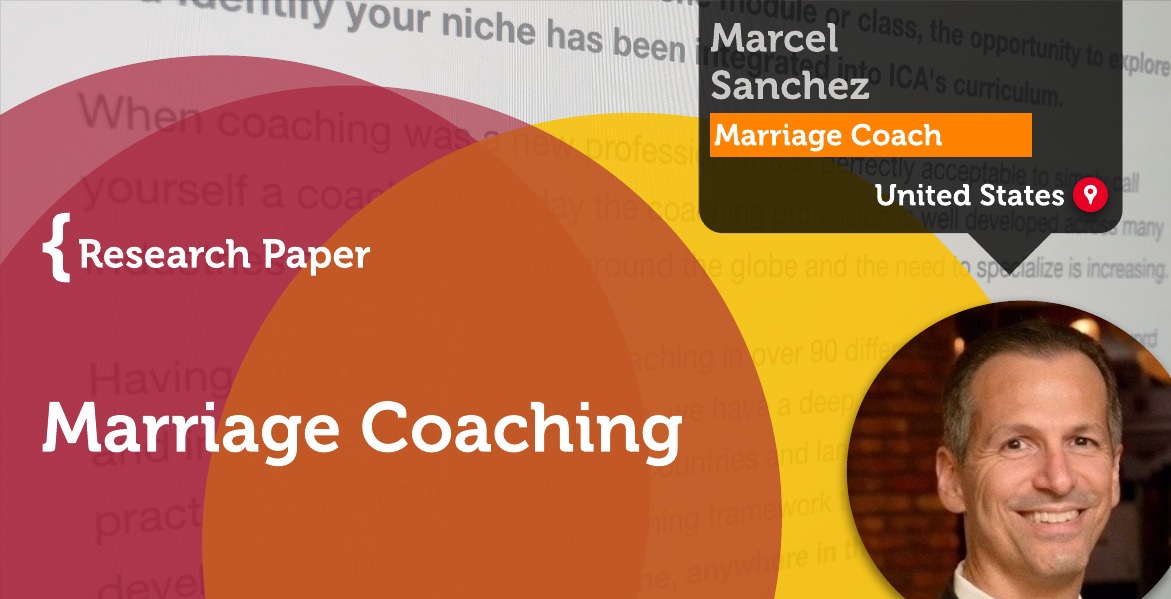
Marriage Coaching for Rapid Change
What do churches, government entities, businesses, and educational institutions have in common since the start of Covid-19? All four of these groups have accelerated their use of technologies such as live streaming, learning management platforms, group video meetings, and one-on-one video meetings. Regardless of how these groups felt about change or technology, they had no choice, but to change and adjust to their new realities.
We saw the evidence of this rapid change as these groups immersed themselves—literally overnight—to maximize technology as quickly as possible. These industries—when participating in leadership and training conferences—adapted breakout sessions to teach participants how to maximize these technologies to increase employee engagement, leadership training, member assimilation, and productivity.
Industries such as construction, legal, logistics, insurance, healthcare, training, and counseling have also experienced increased use of these emerging modalities. Although not always easily accepted by the masses, travel restrictions and preventative health measures have all contributed to the rise of these new modalities to accomplish important meetings, training workshops, and critical tasks. Leading video platforms such as Zoom, Teams, and WebEx have flourished because of this new digital demand.
Although a certain measure of debate remains in some circles, good arguments for online psychotherapy, for example, were more access to psychotherapy and increased availability; (2) improved communication; (3) patient/client benefits; (4) ease of use, client acceptant, and financial cost-savings.[1]
Working through initial apprehensions about online coaching is evolutionary, but one theory I propose—one that is supported by research—is the following, the more individuals and couples use video-based platforms and experience it personally, the more positive they perceive the medium to be.[2]
As it relates to teachers and students in education, what’s exciting about online coaching is that it can mirror in-person coaching and assure good teacher-to-student interaction and consistency.[3]
For the purposes of this research paper, we want to explore if online marriage coaching–using video-based technology–can be an effective alternative
for in-person marriage coaching.
Online Marriage Coaching
Both marriage counseling and marriage therapy have developed online over the years. These two areas flourished during the peak of Covid-19 using video-based technologies. Today, although some restrictions have been lifted—and new restrictions have started—video-based technologies continue to serve a significant need by helping individuals and couples work through mental health needs, marriage problems, and other relational issues.
The world of coaching—which includes at the very least, coach certification training, group coaching, and one-to-one coaching—has also felt the impact of Covid-19 and the shift to increase video-based coaching practices. Coaching has experienced a significant transformation in methodologies while building unprecedented opportunities for scalability.
The International Coaching Federation (ICF) defines coaching as “partnering with clients in a thought-provoking and creative process that inspires them to maximize their personal and professional potential. The process of coaching often unlocks previously untapped sources of imagination, productivity, and leadership.”[4]
As I reflect on the evolution of coaching in my own life, words such as vision, mission, partnership, collaboration, synergy, clarity, alignment, stimulation, challenge, and movement have served to shed light on my area of focus and the long-term impact it could have on the lives of others. Since my area of expertise is marriage coaching, a simple coaching model has served me well throughout the last twelve years: Dream, Connect, and Build.
The Problem
Many busy business professionals want to improve their marriage but find it extremely difficult to take time out of their high-demand work schedules to work on their relationship. Add unpredictable traffic, dinner preparations, exercise, social commitments, and homework with the kids to their schedules, life becomes very exhausting. Oftentimes, a short window of time—about thirty minutes at the end of the day—is all that’s left before these couples head to bed.
One of the most respected training organizations in the world, The Ken Blanchard Companies® revealed interesting to research in their 2022 HR/L&D Trends Survey. Eight hundred participants were asked to identify the single largest problem their teams faced in designing learning experiences for a hybrid work environment. Three key themes surfaced: First – People are overloaded, tired, and “too busy to learn”; Second – The level of connection is dropping; Third – L&D is stretched and dissatisfied with converted offerings.[5]
With these things in mind—and the pace of life accelerating rather than decelerating—it only makes sense to adjust our desire to help married couples build thriving marriages around their availability if the willingness to be coached is present and ready for action.
This same group of busy business executives was asked about their work characteristics, “What would make your digital/virtual designs better?” Those that responded indicated: Higher-quality learning experience, 34%; More L&D resources, 17%; and more digitally competent learners and trainers, 17%.[6] These busy professionals wanted more rather than less, but they wanted more of the right tools for their long-term success.
I find this to be true among many married couples. They not only want to grow their relationship, but they also want to find the best resources available to make stronger gains in less time. These couples want the best coaches. Why? Because they understand those good coaches will help them arrive at the best destination for their marriage relationship. Moreover, these couples want more on-demand tools that provide maximum flexibility without sacrificing quality.
But wait, there’s more. This same group of busy professionals was asked about how they would spend their time and money if given more learning and development resources. Once again, each response mirrors what we desire for every couple who commits to marriage coaching. When asked, 47% would convert their workshops into learning journeys and 39% would focus more on reinforcing learning and holding learners accountable.[7]
Can you see the parallels with marriage coaching? More than classes, workshops, and seminars, married couples want their coaches to collaborate and explore a new journey together. A “learning journey” may be the perfect phrase. Both the coach and the married couple learn to discover new possibilities for their relationship. A class is often dull and ends with an assignment. A journey on the other hand is often adventurous; it ends with hope.
The second response has to do with accountability. When accountability is lacking, progress lacks behind as well. The coaching process moves towards increasing levels of accountability and progress. The coach serves as the facilitator in this journey. The coach prevents each spouse from deviating from their agreement. They not only remind each spouse of their commitment to one another but also, their unique commitment to moving the relationship forward as established in their coaching agreement.
For online coaches, commitments, progress, feedback, and keynotes can be documented through online coaching portals.[8] This practice is already well established in today’s most innovative organizations. It only makes sense to apply this practice to online coaching engagements to maximize efficiencies and effectiveness.
So, what happens when these busy couples grind through life at an intense pace? What happens when their relationship begins to plateau rather than grow? Often, their marriage suffers because their relationship is neglected in the process. What I have found through the years as a marriage coach is that this steady relational decline is not intentional. For the most part, it’s a subtle drift in the relationship that happens quietly, but steadily. What I’ve discovered is that many of these high-performance individuals will say things like:
“Everything is fine; we’re just like every other couple.”
“This is our time to build our careers while the opportunities are readily available.”
“We have to keep up with our business growth and work the extra hours.”
“Our family will be better off financially in the future if we make these sacrifices today.”
“Our children are resilient; they can adjust and handle the pressure.”
“We’ll take the family on a great vacation this year; that will bring us together as a couple.”
Here’s the reality. Busy married professionals tend to replace their relational drifts with more activities to do rather than with marriage coaching to reflect on. The issue is not that these couples don’t want marriage coaching. The issue is not that they don’t believe in the potential of marriage coaching to reignite their marriage relationship or to help them get from where they are to where they want to be as a couple. The real issue for these busy professionals is that they don’t believe they have the available time required for marriage coaching to fit into their busy and unpredictable schedules.
The Solution
My argument in this paper is that marriage coaching—although a less known practice when compared to marriage counseling and marriage therapy—should also benefit from video-based technologies available to us today as other industries and professionals have experienced in recent years. My personal belief is that the opportunity for marriages to flourish—especially for busy business professionals—has not yet experienced its true potential. However, online marriage coaching can release this untapped potential and make marriages soar once again.
Why should we wait until married couples reach the peak of their frustration levels with one another and relationally disconnect before intervening to get real help? Why not leverage proactive marriage coaching while the relationship can pivot rather than wait—in complete reaction mode—for a total relational collapse?
There are so many benefits to coaching. Would these benefits not transfer to busy business professionals that want to grow their marriage? Of course, they would. Coaching brings out the best in individuals. It can do the same for couples in their marriage as well. Ken Blanchard reminds us of the powerful impact of coaching on the lives of busy professionals. Coaching evokes new skills, increased behavioral knowledge, valuable experiences, goal-orientation, self-reliance, increased responsibility, more productivity, better commitments, and higher levels of satisfaction.[9]
When both husband and wife fully commit to marriage coaching to grow their relationship, both will benefit, and both will be positively influenced by this commitment. According to Relational-Cultural Theory, in a growth-fostering relationship, both people are open to being influenced and changed by the other.[10] This is the power behind marriage coaching. Not only can it bring couples together to focus on their relationship, but it can also evoke the required energy and personal will to implement new and collaborative approaches to relational transformation.
Marriage coaches can help busy business professionals by serving as “skilled coaches” in their relational development and personal growth. These coaches stir what’s uncomfortable to evoke what’s possible. As relational surgeons, marriage coaches carefully collaborate with their clients to remove the annoying obstacle of limiting beliefs while introducing new possibilities for their future.
The skilled coach will challenge clients at a deeper level by raising penetrating questions that clients never ask themselves, flipping client stories for real accountability, drawing out unexamined self-awareness, and releasing limiting factors to success.[11] This new awareness gives individual clients and married couples a new platform from which to evaluate what’s before them and their new possibilities.
In Relational Cultural Theory, for example, mutually beneficial relationships lead to five good things: Zest – energy, vitality; Creativity – increased sense of ability to act; Worth – a greater sense of self-worth; Clarity – more accurate self-awareness; and Desire for more connections.[12] This is exactly what marriage coaching can deliver to couples. A marriage coach can laser focus on what each spouse needs and translate those needs into action.[13]
What married couple would not benefit from increased passion, clarity, and action? What relationship would find fault in having more accurate self-awareness or greater self-worth? As married couples begin marriage coaching, studies reveal that they can expect to gain greater inner awareness and new approaches to what’s not working in their lives. What does this do long-term? Married couples improve their communication skills, manage day-to-day life better, increase relational and personal confidence, and build new soft skills.[14]
Perhaps, the online environment allows clients to provide information that they would never reveal in direct contact with a counsellor.[15]
Online Marriage Coaching Success Factors
Different forms of online therapy have served our men and women in the military for well over twenty years.[16] With the exponential increase of smartphones and apps, availability for coaching, therapy, and counseling are easier to get started and continue. It has moved far beyond the military and into the hands of every mobile consumer.
Online marriage coaching can serve military and non-military couples effectively. Coaching that provides maximum flexibility for married couples to not only participate but thrive in their relationship with one another, is the best kind of coaching. This speaks to the heart of online marriage coaching—also known as virtual marriage coaching or e-marriage coaching—where coaches and couples leverage technology to move the marriage relationship forward. The flexibility it provides busy professionals to work on their marriage is beyond timely, efficient, and encouraging in the coaching process.
Online coaching provides clients with the flexibility to work at their desired pace–and at their desired location–while allowing automatic reminders, emails, and tasks to help them follow on-demand training at a reasonable pace.[17]
Done right, personalized online marriage coaching brings out the best in everyone.
While goal setting helps them get clear about their relational objectives.[18]
Instead of waiting for their relationship to deteriorate before acting, busy business professionals can now do something constructive to catalyze their marriage. Today, there’s a much better way to serve and strengthen married couples. Busy business professionals can find real hope in their marriage. Online marriage coaching is the answer, but this solution does have some initial perceptual challenges to overcome. Online marriage coaching is just getting started—while many places it in the category of “infancy” as it relates to professional awareness or acceptance—but the potential for marriage enrichment is immeasurable.
With the increased availability of the internet in recent years, more and more married couples are moving towards web-based technologies—in part due to the low cost and invaluable ease of use—to strengthen their relationship.[19] And with this new shift—although it is still very young in its development, experience, and presence—web-based programs are by far the go-to resource for married couples who desire relationship improvement.[20]
Since in-person marriage coaching as a profession is just starting to carve out a new path forward for married couples to consider, it’s not surprising that online marriage coaching is relatively unknown to most couples I engage in conversations with. So, I’m confronted with a dilemma, one that exists as both a challenge to solve and an opportunity to capture.
One challenge in online marriage coaching—and any coaching for that matter—is to find the right “fit” for the client and the coach. Here again, we see how a challenge can become an opportunity for married couples when they choose online marriage coaching.
What do you do if the three marriage coaches in your county are booked solid until the following year? Or worse, what if you and your spouse had an initial meeting with each coach only to discover a total lack of synergy or connection?
Each of these scenarios would be highly discouraging if it were not for several key benefits of marriage coaching: married couples can be coached from anywhere in the globe if they have an internet connection. Distance is no longer a problem to solve, but an opportunity to explore. Today, there is an unlimited number of professional coaches available to serve at a moment’s notice. Online marriage coaching widens the pool of available coaches, helping couples move beyond the “nearest coach” to the “best coach” for their coaching engagement.[21]
Distanced-based coaching—although perceived as negative for some with regards to personalization and engagement—is a more favorable factor in the coaching process than a less favorable factor. The benefits of in-person coaching are numerous indeed, but let’s not discount the online benefits too quickly. There is no “one-size-fits-all” to coaching.
The effectiveness of coaching is not measured by the modality of coaching, but rather by the effectiveness in helping our clients move forward along their journey.
Can you find compassion, empathy, acknowledgment, and coaching presence through video-based platforms? Yes, absolutely. Can you find exceptional online marriage coaches? Yes, absolutely. Can online marriage coaching help clients explore deeper levels of self-awareness and evoke new possibilities for their relationship? Yes, absolutely. These experiences have been documented in therapy sessions and marriage coaching sessions as well. Sometimes for coaches and their clients, “distance” can serve as a good partner.
Key Benefit of Online Marriage Coaching
Online marriage coaching can facilitate deeper levels of self-awareness through the sheer distance and safety of the coaching engagement and process. Clients have reported feeling an increased sense of comfort and control—which has led to many positive outcomes—with the entire process of online coaching.[22] The benefits for married couples are indeed many.
As a Pastor, online marriage coaching has significantly helped me to reach married couples faster and with greater efficiency. But what has surprised me the most has been the effectiveness of this methodology. The focus of our conversations is very concentrated. The virtual environment is encrypted and safe. The conversations are enjoyable, dynamic, and secure.
Working with a marriage coach is certainly not for everyone, but the benefits of online relationship coaching could help married couples bridge the gap between wanting healthy relationships and having them.[23]
Yes, a big part of this online marriage coaching effectiveness will always rest on the skills and presence of the coach. Coaches must be qualified, competent, and fully engaged in the coaching process. To be sincere, at times I forget these sessions are taking place on a live video platform and not in person. Beyond what most technology skeptics would admit, there are times when online coaching can get to the heart of the matter faster than in-person coaching.[24]
Another key benefit of online marriage coaching is that it makes things easier for the resistant spouse when accepting coaching invitations. In other words, online marriage coaching removes barriers. When traveling to appointments and fighting traffic, the obstacle is removed. When finding childcare, the obstacle is removed. And when being in a safe and comfortable environment is another requirement, this obstacle is also removed.
When one partner or the other does not want to attend marriage coaching sessions, having the sessions online can help convince them to participate with virtually no resistance.[25] In short, online coaching has the unique ability to substitute in-person marriage coaching sessions.[26]
Online marriage coaching serves to stimulate growth in couples from all socio-economic backgrounds. Coaching is not reserved exclusively for the middle-class or the filthy rich; neither does it discriminate against the poor. One study, for example, demonstrated favorable results, when using web-based interventions as the central role in delivering effective coaching sessions to functioning low-income married couples.[27]
Combining Online Marriage Coaching With On-Demand Courses
As couples approaching marriage and those that are already married work through my web-based online marriage course, Marriage Catalyst Online Course/Matrimonio Por DiseñoCurso Digital, something unique takes place as these couples work through the course on their own time and at their own pace. They begin to flesh out their initial feelings together—both comfortable and familiar feelings and uncomfortable and unfamiliar feelings—and process what they feel at their own pace and in their own space.
This process naturally evokes new conversations, challenges current approaches, and serves to provide couples with alternative perspectives to consider and evaluate first on their own. And once these couples arrive at our online session, they’ve had at least one full day to process what they’re discovering. It naturally leads them through a process of curiosity, deeper reflection, and self-discovery. In her article, “What are the Top 5 Reasons You Should Take an Online Marriage Course,” Rachel Pace argues that judgment is removed in online marriage coaching along with initial embarrassing discoveries due to the space provided and the time it gives couples to process what they’re discovering about themselves, especially what’s private and uncomfortable.[28]
In other disciplines such as mental health, online training programs have recently been combined with spirituality and some form of therapy. Professionals are aware of the value of this powerful educational package in driving behavioral change. For example, Spiritual Competency Training in Mental Health is an innovative online training program with 8 modules designed to develop basic competencies in 16 spiritual competencies with guidance from leading experts in spiritual and mental health.[29]
Another way of describing the combination of online marriage coaching with an online marriage course is relationship education. Although there are different combinations—depending on your educational and professional background—relationship education is a mixture of effective educational modalities and practices. In Europe for example, online counseling is growing—and linked to experiential online training courses—and has become a common meeting option for those seeking help.[30]
Regardless of the combination of modalities, the goal is the same—relational health and success. Couples participating in these interventions have reported gains in relationship satisfaction and confidence and improved overall quality of life.[31] Coaching can dramatically improve communication in a marriage, thereby improving overall relational health.[32] For this reason, my methodology over the years to help married couples build stronger and healthier marriages has consisted of combining online marriage coaching with an online marriage course.
This course—as with others—has consistently provided couples with course flexibility, great content, engaging conversations, and good coaching. The potential to improve marriages for the better is both broad and deep.[33] The results have consistently been marked by higher confidence, relational satisfaction, and better quality of life.[34]
Sustaining New Patterns of Thinking and Behaviors
Let’s pivot to the most impactful new trends—both in business and in marriage—which directly relates to online marriage coaching combined with on-demand courses. This will serve to help us build a new way forward for married couples and their long-term relational health. For starters, coaches and trainers practicing high accountability for what is expected, learned, or agreed to is of utmost importance.[35]
Peer group support was a second key factor.[36] People need support in their learning journey. Interacting with their peers has proven to be an invaluable source of strength and encouragement. The last two factors consist of refresher events and team activities.[37] Refresher events and activities provide the relational recharge required for sustained health and continuous learning.
Another important preferred trend for individuals and couples is self-paced learning. Flexibility, especially during the pandemic, has surfaced as a leading factor for training and development. Self-paced eLearning increased from 16% pre-COVID to 24% during COVID and was expected to remain stable at 25% post-COVID in many organizations.[38]
The rise of audio-video-based platforms is one trend that continues to increase. Since the pandemic, coaches have increased the use of audio-video platforms by 74% (Figure 1-2).[39]
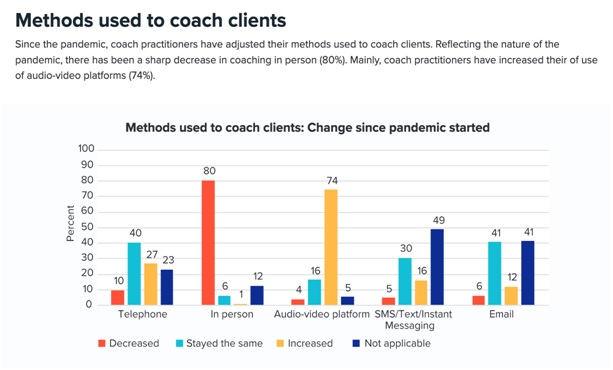
Every region has seen significant increases in the use of audio-video platforms to coach clients.[40]
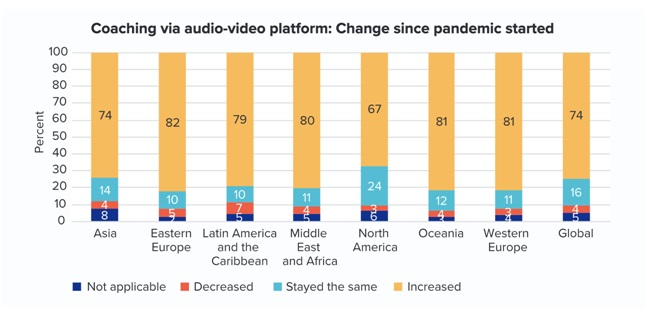
Most coaches (63%) disagreed or strongly disagreed with the statement: “After the pandemic, coaching will return to pre-pandemic methods (Figure 3).” [41]
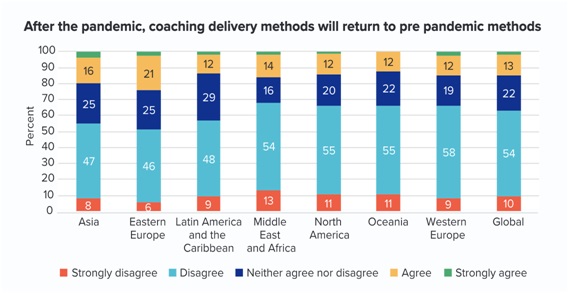
Most coaches (85%) agreed that clients are more open-minded to integrate new video-based platforms and other platforms as well, as a part of their coaching sessions.” (Figure 4) [42]
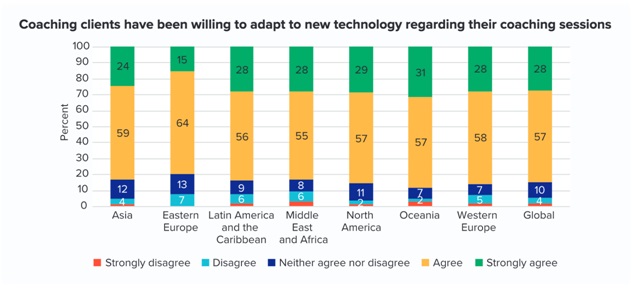
More than half of coaches (52%) agreed that Life Vision Coaching and Enhancement Coaching will grow” (Figure 5). [43] Marriage coaching certainly aligns with Life Vision and Enhancement Coaching.
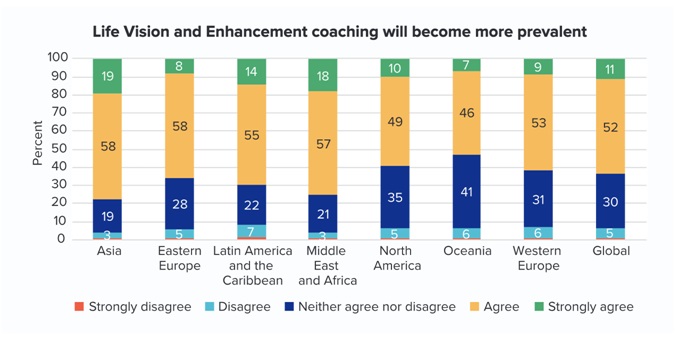
In a most interesting research study, participants were asked what would be important to them regarding the process variables of in-person coaching, telephone coaching, and virtual coaching. Although initially skeptical about virtual coaching, participants experienced increased positivity scores once the virtual coaching sessions started. This research supports our original theory. Once people begin to experience online coaching, they will find numerous benefits and thoroughly enjoy the overall experience.
Figure 6 illustrates attitudes towards virtual coaching regarding several process variables before experiencing online coaching/virtual coaching.[44]
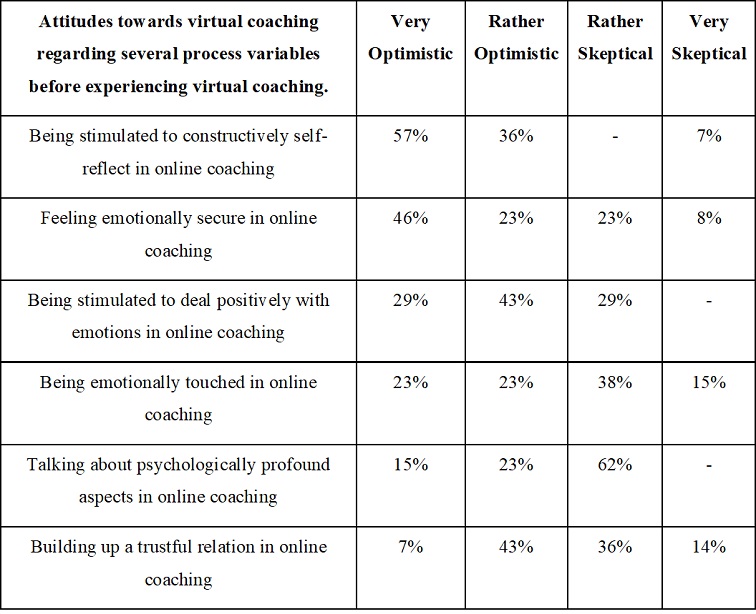
With these things in mind, it should not surprise us that people unfamiliar with online coaching, especially online marriage coaching, would naturally be apprehensive about this methodology to grow their marriage. But to the surprise of many, divided mindsets were noticeably outweighed by positive expectations and experiences (Figure 7).[45]
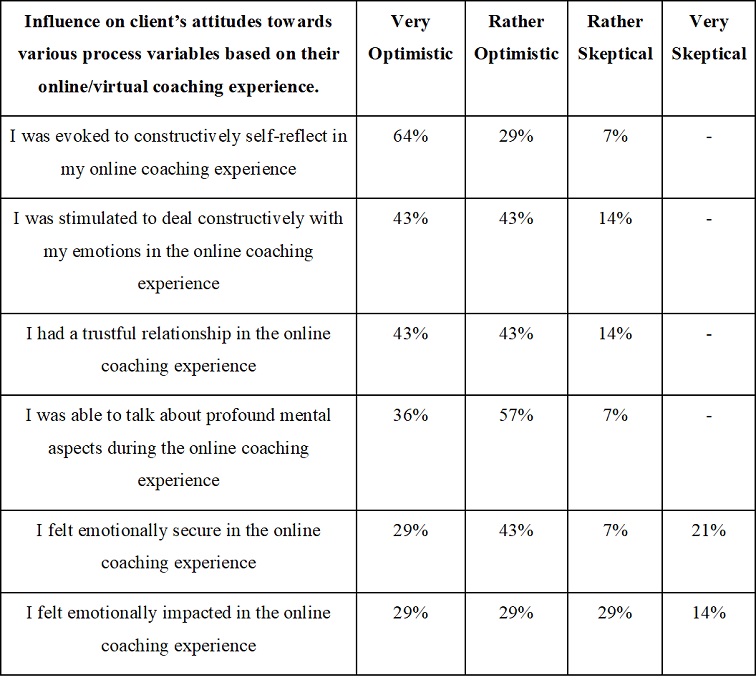
What we discover as we reflect on both charts is the increasing positive experiences realized by coaching clients when compared to the initial apprehension and attitudes with virtual/online coaching. The initial perception was surpassed by the experience. The percent increase is significant. The virtual/online coaching experience removed the initial apprehension.
Let’s highlight several key points from what this important study uncovers about virtual/online coaching. As coaches, we should anticipate some level of apprehension from our clients. This should lead coaches to proactively inform their clients about the benefits of this coaching methodology and how it can help them move forward in life.
As clients, some initial apprehension is expected. This can be overcome through the virtual/online coaching experience. Client/participant satisfaction levels are above eighty percent. Based on the research provided, coaches can be more confident when recommending virtual/online coaching sessions to their existing and prospective clients.
If clients only consider virtual/online coaching without ever experiencing this methodology, they will never fully understand the unique value it brings to coaching. The number of virtual/online coaching sessions is directly related to client/participant satisfaction. As sessions increase, so will the satisfaction level of the client.
All clients/participants in the study would recommend virtual/online coaching methodology to others. Clients/participants met their goal by the end of the third virtual/online coaching session. Clients’/participants satisfaction, degree of learning, and disposition to recommend degrees of outcome attainment—during coaching sessions and after coaching sessions were completed—even after twelve months, remained relatively high (a mean of 68%). Clients/participants who prefer video-based platform coaching sessions are younger than those who prefer in-person coaching.[46]
Video-Based Online Platforms Marriage Coaching
Video-based online platforms are here to stay—for businesses, organizations, educational institutions, and leaders—and so is online coaching. Covid-19 accelerated these platforms and forced us to adjust in unprecedented ways. Married couples seeking relationship coaching have learned to abruptly adjust to these changes as well.
With these things in mind, online marriage coaching—according to research—is emerging as an effective and viable alternative to face-to-face contact for engaging couples in coaching conversations, relational support, and collaboration.[47]
We now understand that although younger couples may prefer online coaching modalities, more and more married couples—both young and old—are experiencing high levels of satisfaction once they begin the online marriage coaching process.[48] The benefits of online marriage coaching—used in combination with on-demand marriage courses—are not only unlimited in scope but highly effective when measuring relational coaching success factors.
Let’s circle back to our original question. Can online marriage coaching be an effective alternative to in-person marriage coaching? The answer is a definitive “Yes!”As we conclude, let’s summarize key benefits learned throughout our study as it relates to online marriage coaching and self-paced learning for married couples.
Increased space to carefully process marriage training videos in private first before engaging with the marriage coach online.
Elevated levels of self-awareness and personal reflection are evoked.
Greater levels of coach and coachee accountability are realized.
Relational satisfaction levels increased substantially.
Resistant spouses have obstacles to marriage coaching removed.
Self-paced learning is accepted and taken seriously.
Married couples can be coached from anywhere in the world.
Creating an environment of trust and safety is quickly realized.
Sessions are profound and emotionally impactful.
Session outcomes are obtained.
Relational passion, self-confidence, and communication skills thrive.
Life/work balance, work performance, and time management flourish.
New patterns of thinking and behaviors are realized.
References
Julia Stoll, Jonas A. Müller, and Manuel Trachsel, "Ethical Issues in Online Psychotherapy: A Narrative Review," Frontiers in Psychiatry 10 (2020): xx, doi:10.3389/fpsyt.2019.00993.
J. R. Carlson, R. W. Zmud. “Channel expansion theory and experiential nature of media richness perceptions.” Academy of Management Journal; V. 42. Issue 2, (1999), pg. 6. doi:10.2307/257090.
Education for All (blog). GPE: Transforming Education.
“What is Coaching?” International Coaching Federation. ICF.org.
Ken Blanchard. 2022 Trends: Learning and Development in a Hybrid World (Escondido: The Ken Blanchard Companies, 2021), pages 2-7.
Blanchard, 2022 Trends, 10-13.
Blanchard, 2022 Trends, 14-15.
BetterUp (Blog). Virtual Coaching: The Benefits of Coaching without Constraints.
Ken Blanchard. “Managing Coaching for Results and ROI.” (Escondido: The Ken Blanchard Companies, 2021). page 4.
Judith Jordan.“Relational–cultural theory: The power of connection to transform our lives.” The Journal of Humanistic Counseling, 56, 3, (2017),
What is Coaching? Everything You’ve Wanted to Know. iPec Coaching)
Judith Jordan. “Relational–cultural theory: The power of connection to transform our lives.” The Journal of Humanistic Counseling, 56, 3, (2017). (December 21, 2021)
Samantha Dewitt, "Marriage Coaching Can Save Your Relationship | Regain." ReGain - Relationship Therapy/last modified August 11, 2021/December 21, 2021
What is Coaching? Everything You’ve Wanted to Know, (iPec Coaching)
Salome Van Coller - Peter and Linda Manzini, “Strategies to Establish Rapport during Online Management Coaching,” SA Journal of Human Resource Management
Amy Novotney. “A Growing Wave of Online Therapy.” Monitor on Psychology (American Psychological Association, February 2017)
Jeremy Sutton, “How Online Interventions Are Changing Coaching Forever.” PositivePsychology.com
BetterUp (Blog). Digital Coaching and the (Surprising) Effectiveness of Virtual Platforms.
Allison Megale, Emily Peterson, and Myrna L Friedlander, “How Effective Is Online Couple Relationship Education? A Systematic Meta-Content Review.” Contemporary Family Therapy. (2021)
Emily J Georgia, Brian D Doss. “Web-Based Couple Interventions: Do They Have a Future?” Journal of Couple & Relationship Therapy 12, no. 2 (2013): 168–85
Larisa N Cicila, Emily J Georgia, and Brian D Doss. “Incorporating Internet-Based Interventions into Couple Therapy: Available Resources and Recommended Uses.” The Australian and New Zealand Journal of Family Therapy. 35. no. 4 (2014): 414–30
Andrea Kysely et al. “Expectations and Experiences of Couples Receiving Therapy Through Videoconferencing: A Qualitative Study.” Frontiers in Psychology 10 (2019): 2992.
Lisapanos.com (Blog). “The Benefits of Working with an Online Relationship Coach.”
David Dominikus and Biondi Situmorang. “Online/Cyber Counseling Services in the COVID-19 Outbreak: Are They Really New?” Journal of Pastoral Care & Counseling. 74. no. 3
Gabrielle Seunagal. “How You Can Benefit from Online Marriage Counseling.” Regain.us.
Brian D. Doss et al. "Using technology to enhance and expand interventions for couples and families: Conceptual and methodological considerations." Journal of Family Psychology. Vol 31, no. 8 (2017): xx, doi:10.1037/fam0000349.
Brian D. Doss et al. "Online programs improve relationship functioning for distressed low-income couples: Results from a nationwide randomized controlled trial." Journal of Consulting and Clinical Psychology. Vol 88, no. 4 (2020): xx, doi:10.1037/ccp0000479.
Rachael Pace. “What Are the Top 5 Reasons You Should Take an Online Marriage Course.” Marriage Advice - Expert Marriage Tips & Advice/July 6, 2020/December 21, 2021.
Michelle Pearce et al. "A novel training program for mental health providers in spiritual competencies," 2020, xx, doi:10.31234/osf.io/e7nr5.
S.M. Paterson, T. Laajala and P.-L. Lehtelä. "Counsellor students’ conceptions of online counseling in Scotland and Finland." British Journal of Guidance & Counselling. Vol 47, no. 3 (2017): xx, doi:10.1080/03069885.2017.1383357.
Scott M. Stanley et al. "Best Practices in Relationship Education Focused on Intimate Relationships." Family Relations. Vol 69, no. 3 (2019): xx, doi:10.1111/fare.12419.
Anne Micheaux Akwari. "More benefits of coaching." Academic Medicine, Vol 85, no. 8 (2010): 1263.
Michelle Pearce et al. "A novel training program for mental health providers in spiritual competencies." 2020, xx, doi:10.31234/osf.io/e7nr5.
Scott M. Stanley et al. "Best Practices in Relationship Education Focused on Intimate Relationships." Family Relations. Vol 69. no. 3 (2019): xx, doi:10.1111/fare.12419.
Blanchard, 2022 Trends, 16-18.
Blanchard, 2022 Trends, 19-20.
COVID-19 and the Coaching Industry. Methods used to coach clients. International Coaching Federation.
Harold Geissler, Melanie Hasenenbein, Stella Kanatouri, Robert Wegener. “E-Coaching: Conceptual and Empirical Findings of a Virtual Coaching Programme.” International Journal of Evidence-Based Coaching and Mentoring. Vol. 12, No. 2
Geissler, Hasenenbein, Kanatouri, Wegener, “E-Coaching: Conceptual and Empirical Findings of a Virtual Coaching Programme.” Page 179.
Lawrence, M Drake II, “Two Kinds of Presence: A Comparative Analysis of Face-to-Face and Technology-Based Mediated Communication Methods and the Executive Coaching Experience.”
Lawrence, Two Kinds of Presence.